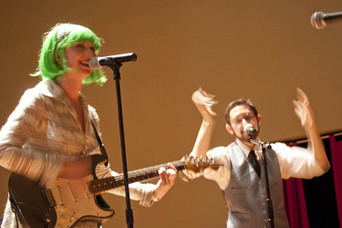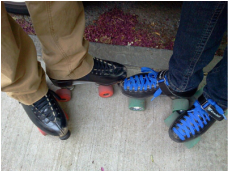(Insert obligatory, half-hearted "sorry I haven't blogged recently" comment here. Okay, moving on.) This past Monday and Tuesday I was pleased to be attending the Jewish Outreach Institute's Judaism 2030 conference. It was mostly a fantastic event, full of great networking and thoughtful, exciting presentations. I was tweeting madly the whole time. After getting back, my head buzzing with big ideas and the thrill of new connections, I decided, what the heck, I'll check my Klout score. Turns out two days of non-stop Twitter chatter had bumped me up six points. Whoa, seriously? Klout is a site that measures a person's influence online. They've developed an impressive array of graphs, charts, and other visual paraphernalia to help you break down and analyze your influence, and compare it with others'. Once you've seen your score, you also have the option of sharing it through your social networks. I, apparently, am "effertively using social media to influence my network across a variety of topics." I am a Networker. It made me proud to hear that - this ridiculous bit of digital validation was kinda cool. Being someone who actively tries to connect cool people, it was nice to see the interwebs recognize and reward those efforts with a tidy little score.
Humans love to measure things. We love to compare. When we have those numbers, those qualifiers, it helps us make sense of the world. We can put things in categories and extract them as needed. But do these measurements really mean anything?
But networking is not about numbers. It's about people, about connections, about making meaning and building enduring, mutually beneficial relationships.
So, what's the relationship between the numbers and the people behind them? Do you tout your Klout? To what end?
 Last night I went out with a college friend of mine whom I hadn't seen in way too long (entirely my fault, but that's another story). She's currently working in a Teach-for-America-style program, stationed in a class of emotionally troubled kids in Harlem. It's challenging, she admits, but rewarding, and it has taught her a lot about empathy...and about authenticity. These kids live in the moment, and if in that moment you're not being real, they'll see right through it and tear you to shreds. It got me thinking. Really, what does it mean to be authentic? Social media is the same way. The first rule of online interactions is that you've got to be real. The minute you become nothing more than a brand, or a mouthpiece, or spam, you turn people off. How, then, do you negotiate the space between revealing nothing and revealing too much? With Stereo Sinai, I often wear these funky colored wigs in concert. On the one hand, it's my little twist on the already somewhat bizarre tradition of Orthodox women wearing sheitels to cover one's hair. On the other hand, it's kind of a commentary on real vs. fake. Stereo Sinai performs pop - the most synthetic music around. We sing in biblical Hebrew, a language rich with meaning. Putting them together, I think, pushes the boundaries and forces questions and to what's really real, what's authentic. Being real, being true to ourselves and others, is something we all are (or should be) struggling with. It's an ongoing process, and not one with a definable product. What kinds of questions do you ask about authenticity? How do you keep it real?
Originally posted on JewPoint0Consider the following tale:Gloria works for a large and respected nonprofit organization. She tweets occasionally for the organization, but also has a personal account. One day, in an innocent slip of the fingers, she tweets about drinking at a party from her work account instead of her personal one. Not registering the error, she finishes her day as usual. June’s colleague suddenly starts fielding messages from the organization’s constituents about the, ahem, unexpected tweet. How should he react? Or perhaps this little story will capture your fancy:Tom recently Googled his organization and found that there were several blogs discussing a project his team was implementing. He was pleasantly surprised to find such an enthusiastic group advocating on behalf of his organization, but the blog was hosting by an organization with explicit political leanings, and Tom’s organization is specifically non-partisan. Should Tom take advantage of building the organization’s network and strengthening relationships with individuals who could contribute a lot to their work, or should he steer clear of anything that could be interpreted as political? How should Tom respond? Both June’s colleague and Tom could really use somewhere to turn for guidance. The way many organizations are facing these and other questions is by developing a social media policy (we recently blogged about the excellent policy developed by the Avi Chai Foundation here: “Avi Chai Foundation Gets Social”). A social media policy is essentially a document that helps define how different groups associated with an organization should conduct themselves online. It is a valuable and powerful tool. A social media policy helps outline both expectations and possibilities for social media interactions. It acts as a go-to document for any questions or conflicts that may arise. A social media policy can provide a sense of security, knowing your team is approaching social media from the same set of assumptions. It can also, somewhat counter-intuitively, foster a sense of freedom in the use of social media – you can jump into the game with more confidence when you know the rules. Perhaps even more valuable than the document itself is the process of developing a social media policy. It encourages a big conversation, an honest discussion of the values and character of your organization and how they should be reflected online. As Beth Kanter explains on her blog, “…if you want the policy to truly work, you need a process, especially if your organization is still grappling with fears and concerns.” The process can present an amazing opportunity for listening, sharing, and reflection among the people who make your good work possible. Darim is here to help you have this conversation and implement your own social media policy. That way, Gloria’s accidental tweet ( a true story which you can find out more about here) and Tom’s political blog posts won’t seem so daunting – with the right approach, they can become opportunities for learning and increased connection with the people who care most about what you do. To dig deeper into this topic and start the conversation, Darim is offering a webinar on social media policies (and because it’s our tenth anniversary, you’re welcome to join us for free). Here is all the information: Social Media Staffing and PoliciesTuesday, May 17, 1-2pmRegister here: http://bit.ly/lZTGphAnd we want to hear from you! Does your organization have a social media policy? If so, what did you learn, or how did you grow through the process of creating your guidelines or policy?
 When I was five, my mom, in a concerted effort to drag me away from Saturday morning cartoons which were clearly eating away at my brain, signed me up for roller skating lessons. After 12 years of countless competitions and an estimated $30k later, I'm a dedicated skater and I know nothing about cartoons. It's absolutely essential that I roller skate now, for a couple reasons. - Because I love it, it's in my blood, and when I don't skate I dream about skating.
- Because if I don't skate, I will sit on my bum and never, ever exercise.
So I have been hunting madly for a rink somewhere in New York, with limited success. Rink skating is far superior to outdoor skating (no twigs, no wind, no hills, no cars...need I go on?), but rinks are not in vogue. They struggle, like any other business in a crappy economy, and have struggled for a while. My home rink, Skatetown, was the site of some disturbing gang activity in the nineties and had (for a while, at least) cut almost all public skate sessions from its schedule, relying more on church groups, school skates, and birthday parties to keep it going. Whether there's a functioning rink in Brooklyn that I would go to without feeling I was risking life and limb remains to be seen. In the meantime, we skate outside. It's fun and kinda charming. Alan and I spent this afternoon rolling through Prospect Park. We passed bicyclists, tiny humans with their parental units, and a drum circle pounding away in the shade. I did tricks and flippy things and twirls, and Alan didn't fall. It's no rink, but it'll do.
|





 RSS Feed
RSS Feed